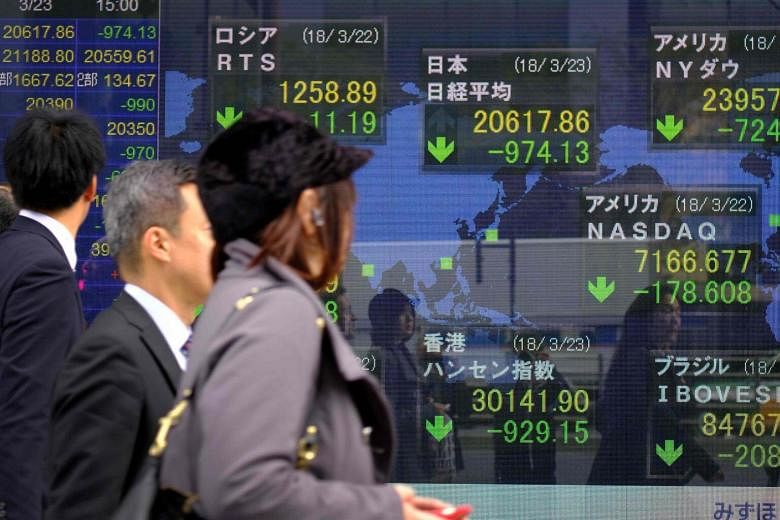HONG KONG (AFP) - Asian markets fell on Monday (July 16) while data showed China's economic growth slowed in the second quarter as the country sits on the brink of a potential all-out trade war with the United States.
After a positive end to last week's roller-coaster ride for equities, investors shifted back into defensive mode in early business with concerns about the impact of tit-for-tat tariffs on the world's top two economies.
Hang Seng was 0.3 per cent lower at 28,442.82 while stocks in Shanghai were down 0.6 per cent at 2,813.42. Tokyo's financial markets were closed for a public holiday.
Beijing said growth in April-June came in at 6.7 per cent, in line with forecasts in an AFP survey and better than the government's annual target but a tad down from the previous three months.
While the reading refers to the three months before US levies on billions of dollars of Chinese goods were imposed, observers had already pointed out the country was likely to struggle with a face-off as leaders battle a debt mountain and pollution.
At the same time the yuan and local stock markets are tumbling.
Newson Friday that China's trade surplus with the US, a major cause of Trump's anger, hit a record in June has added to the tensions.
China faced an "extremely complex environment both at home and abroad", said Mao Shengyong, a spokesman for the national statistics bureau.
In mid-morning trade Shanghai was down 0.6 percent and Hong Kong lost 0.3 percent, while Sydney eased 0.4 percent. Singapore, Seoul, Wellington and Taipei were also lower. Tokyo is closed for a public holiday.
TRADE HOPES
There are hopes that Beijing and Washington can reach an agreement to avert an all-out trade war, with some experts optimistic that China offered a relatively muted response to Donald Trump's threats of further tariffs on US$200 billion of goods.
"Should the US eventually move ahead with these tariffs, China could not escalate on an even basis given China only imports roughly US$130 billion annually from the US, suggesting they would either need to levy higher trade tariffs on a small number of selected products or take the least attractive measure of tactically weakening the yuan," said Stephen Innes, head of Asia-Pacific trading at OANDA.
"Hence the lack of immediate response from China, as administrators will be ultra-careful not to send the wrong signal triggering another market melt in China."
On currency markets the pound held its own against the dollar after fluctuating on Friday in reaction to an interview in which Trump hit out at Prime Minister Theresa May's handling of Brexit and appeared to dampen hopes of a future trade deal, before later taking the edge off his remarks.
Traders are looking ahead now to congressional testimony by Federal Reserve chief Jerome Powell, hoping for some insight on the central bank's plans for lifting interest rates in light of the trade war.

